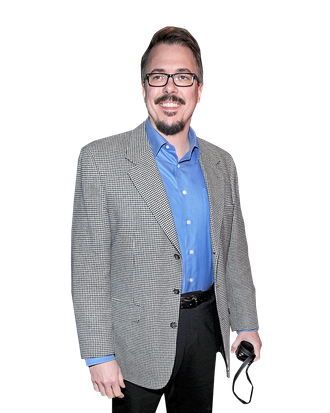

Vince Gilligan has has spent three seasons transforming Breaking Bad’s Walter White, once a mild-mannered Albuquerque science teacher, into a ruthless meth manufacturer. With the fourth season premiering Sunday at 10 p.m. on AMC, we spoke with the show creator (and former X-Files scribe) about what the writing process was like this time around, the pressure he’s under to top last season, and what he’d say if AMC asked him to go three more years.
What did you do with the big gulf of time AMC gave you between seasons three and four? Did you work it to your advantage, or did you see it as a disadvantage?
Well, I’m hoping there’s no disadvantage. I hope there’s a lot of anxious viewers eager to see season four. Actually, I know anecdotally that there are a lot of such viewers, because I hear from people all the time, “Why’d you take so long off?” That was not our idea, but I think we turned lemons into lemonade by using all that time to figure out where exactly we wanted the story to head.
Season three seemed like you were going along and seeing what was next; it didn’t seem as planned as season two.
Season two was a really tricky experiment. We had a bookended circularity to the storytelling, where we started with the very image that would end the season; it was hard trying to figure that one out. Personally, speaking for myself, I wasn’t eager to jump right back into that in season three, nor do we do that in season four. That was maybe a onetime thing, what we did in season two. But it was fun to do, challenging as hell — but we don’t want to repeat ourselves. We want to keep the show fresh and keep the folks guessing and just when people think, Oh, I see, I get it, the show is about, you know, the first thing you see is the last thing you see — we wanna change it up.
How did the “holy crap!” reaction to the season-three finale affect how you guys wrote four?
Well, the reaction to the end of season three did surprise me, and what seemed to happen was not as clear in people’s minds as I might’ve thought it was. So we did indeed spend our first couple of days in the writers’ room on season four reconsidering what we had planned, and talking through, “Is that the best thing to have happen?” We were in good faith trying to figure if the plans we had for starting off season four were the right ones. At the end of the day, the choice we made for how to press forward was the choice we felt was the most honest, and the one that would best continue the story. We all agreed that we should go ahead and do exactly what we originally planned to do.
Do you guys feel pressure to top yourselves in terms of shocking moments? There were a lot in season three.
Well, it’s probably human nature to want to top yourself. You don’t want to start with your best scene and have it all be downhill from there. So I think it’s human nature to want to continually top yourself, and I plead guilty to that. But having said that, I think what holds us in good stead is that we do our best to tell the story organically, which is to say, we do our best to let the characters inform us as to where it is they’re headed. We continually ask ourselves: “What does Walt want out of life? Does he even know what he wants? What do we think he really wants? What does he say he wants? What is he afraid of? What is he hoping for? What outcome would be best for him? What would we be worst?” We ask ourselves over and over again.
Isn’t his goal in season four to kinda stay alive?
Yeah, I guess that’s not a deal-breaker to give that away. Walt has one big goal in season four which is to stay alive, and so having said that, it’s — you know, the show gets darker by the episode, and it’s not that we’re intentionally trying to be as dark as we can be. In fact, some days we’re looking for any way to lighten the story up, to find a bit of humor, albeit dark humor, in every place we can. But we are trying to be honest about what it is like to live in this world, to decide, “I want to be a meth kingpin” and go about that. If you make that decision in your life, if you survive long enough, your world is gonna get pretty dark, and if you do the things you need to do to survive in that world, you yourself are going to become a person that perhaps you wouldn’t have even recognized.
How do you continue to make Walt a likable character, then?
Again, speaking to human nature, I want folks to like Walt just like I’m some kindergartener wanting folks to like me. But our best days in the writers’ room are days where we put that sort of basic need aside and say to ourselves, “This thing that happens next feels like the right thing, but people aren’t necessarily gonna like Walt when he does it.” And there are some moments where Walt makes some decisions based on some fundamental need that he’s facing that are not particularly altruistic decisions. And you let the chips fall where they may in the writers’ room.
Is the fact that Walt was dying of cancer or the hardships of his previous life in general going to start coming back into play at some point?
The cancer is touched on in season four. He is still in remission when we find him in season four, and perhaps that will continue. But cancer is still — it’s a much reduced part of his life and his outlook now, because ironically, he’s gotten the best possible health care because of the money he’s made selling crystal meth. So that’s the irony: He’s gonna live a lot longer than he would’ve because of this decision he’s made. But these are all elements that sort of got us on our path and got our show started that still exist but have sort of faded in the background a little bit.
We asked readers to submit some questions, and one question Ambiguity asks is, “How many seasons would you ideally get?”
Well, I hate to sound wishy-washy because there are probably some interviews I did a couple of years ago where I said, “Three seasons and we’re done,” and now here we are, through season four. Currently, I’m thinking five. It’s tricky, because a big part of me wants the show to go on forever. This is the most creatively satisfying job I’ve ever had — and I’ve had some good ones — but this is hands-down the best. But I have to weigh that against [the fact that] this show was meant to be somewhat closed-ended and finite since day one, and I don’t want to discard that idea and therefore adulterate what this was supposed to be from the get-go.
So if AMC came to you and said, “We want a season six and seven” …
I think I’d have to say no, probably. At the end of the day, if you don’t feel you’ve got enough story to tell, then you’re taking someone’s money for all the wrong reasons and just treading water, story-wise. I mean, a show like Mad Men, which I hope goes on forever, is to me designed to be a very open-ended show that could go on for years to come. Most TV shows are, and that’s the great thing about TV. This show is, by design, meant to be something else.

